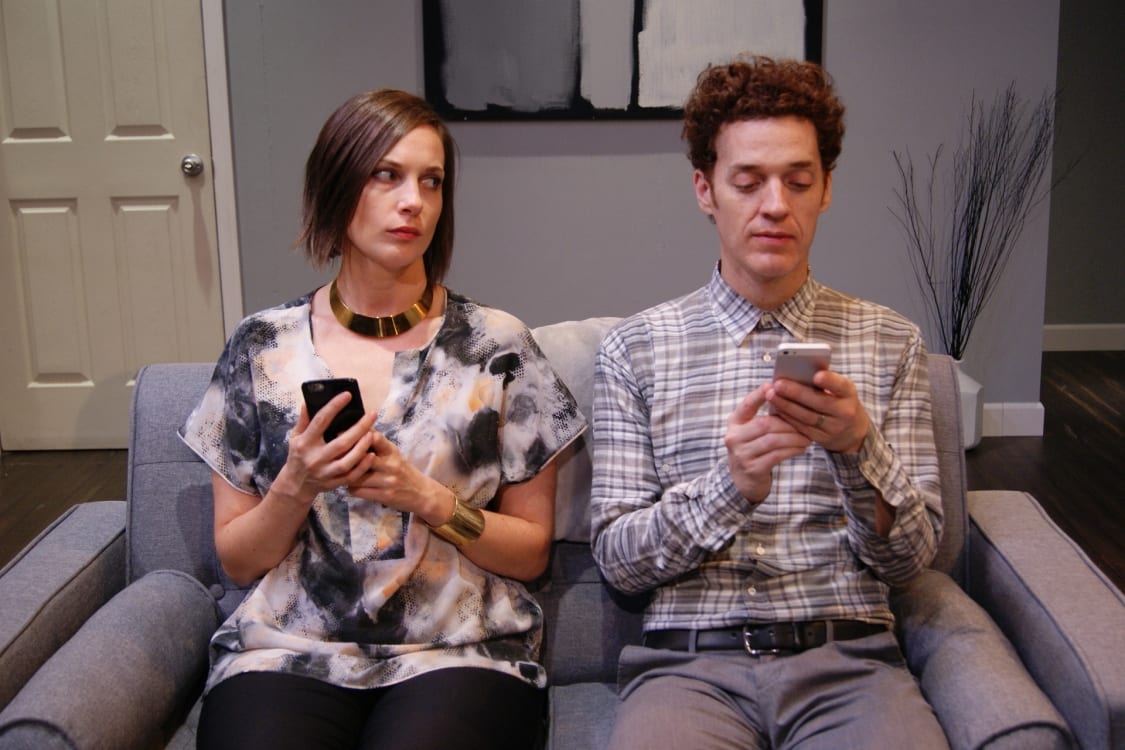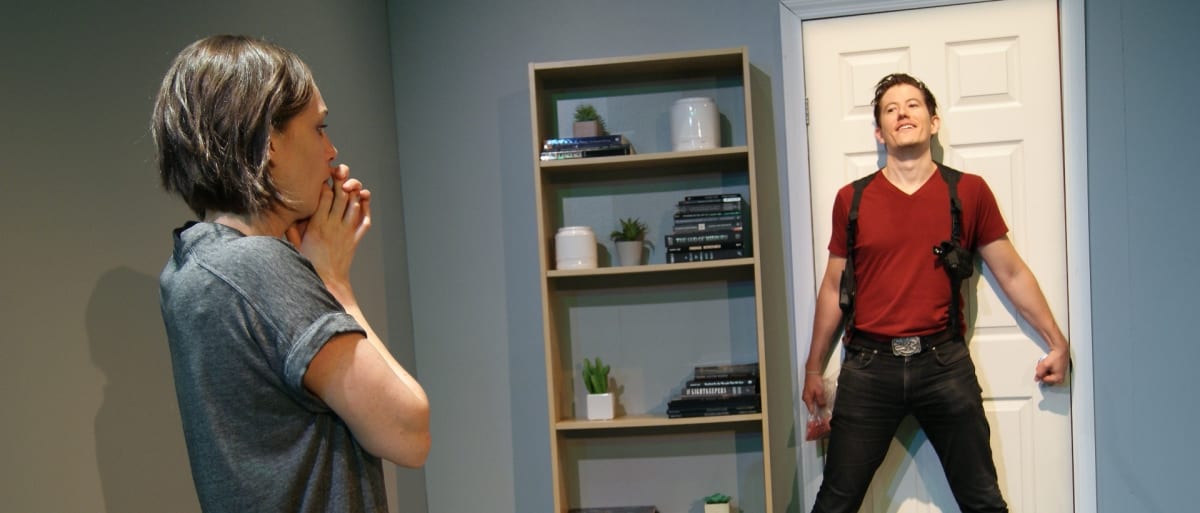New Ohio Theatre is all about the downtown scene. It hopes to promote an independent theatre community there, so their theatrical choices can be – in the words of their mission statement – “most …gut-wrenching, frivolous …foolish and profound theatrical endeavors.” Now that’s a range of possibilities, and Mark Chrisler’s Worse Than Tigers, skillfully directed by Jaclyn Biskup as New Ohio’s latest offering, tests those limits.
Worse Than Tigers takes its place in the theatrical tradition that includes Ionesco’s absurdist theater with a touch of Pinteresque dialogue and a bit of Albee’s George and Martha from Who’s Afraid of Virginia Woolf? thrown in.
The play opens with the unhappy married couple, Olivia and Humphry (Shannon Marie Sullivan and Braeson Herold) in a state of emotional stasis, sitting stiffly with their cells on their perfectly centered sofa, angled at 90◦ to their living room chair on a rectangular rug, paintings of black and white square on gray walls, without much cheer or comfort. This set, designed fittingly by Matt Carlin, sets the tone for the entire play. Within an environment of a depersonalized waiting room, this couple awaits their redemption for failure to acknowledge the reality of their lives. Thus the absurdist journey to truth.
Theirs is a union which has come to stultify any real communication, emotional or physical. Their desperate attempts at communication are in the guise of retelling their experiences in a “joke-wise” manner, as Humphry avoids the reality of their situation by referring to himself as Reginald. These jokes act as exposition for the audience about life before now when Olivia and Humphry might have been happier. This is the source of the comedic which Chrisler refers to in his subtitle: “A Comedy, until it’s not.” And in the first act, one must listen carefully to hear, nestled within one of the jokes, the soul of “until it’s not: “And when our baby was born there was a black president, and when it dies he’ll be up for reelection!”

The emotional safety established in deflected and misunderstood bantering in this house cannot keep the outside world from intruding. The comic, albeit pathetic verbal intercourse is interrupted first with sudden and loud knocking at the front door, accompanied by a growl…yes, a low, throaty purr, presumably of the eponymous tiger. In bursts Officer Kirk Patrick, Olivia’s lover, played by Zach Wegner with an exuberant sexual power that frightens Humphry and arouses Olivia out of their stupor. He, along with the ever-present threat of the tiger, dispels the prevalent lethargy of their lives. His lustful appetite echoes the tiger’s craving. He taunts Humphry and entices Olivia. Humphry takes it. Olivia succumbs. Humphry takes that as well. Humphry is a moral puzzle in this respect as he is incapable of standing up to Kirk’s force. Although it is clear that Mr. Herold is a more than reliable actor, his characterization of this fearful husband often renders him more of an adolescent in spirit than a husband stunted by tragedy.
Chrisler has an important message for us. The obvious symbolism of Kurt and the she-tiger used to dislodge Olivia and Humphry from their dispassion is essential to the purpose. To answer the question of what is worse than tigers, the characters answer “nothing” over and over again. The sound and the fury of Kurt and the tiger’s appetites signify the ultimate of smothered emotions that lie beneath a series of ridiculous and frivolous wit…and absurdist conundrum.
The resolution comes in the second act after Kurt has ravished Olivia and the tiger has mauled her way through the house and ensconced herself in Olivia and Humphry’s bedroom. She lures the couple to her ravenous jaws only after they have expressed the sorrow that has ripped their lives of passion and meaning.
This is the power of Mr. Chrisler’s play. The back-and-forth flippant chatter finally gives way to Ms. Sullivan’s mesmerizing and heartbreaking reveal of a devastating sorrow. It is the moment when both the audience and Humphry must release themselves from the safety of humor and face of pain of tragedy.

